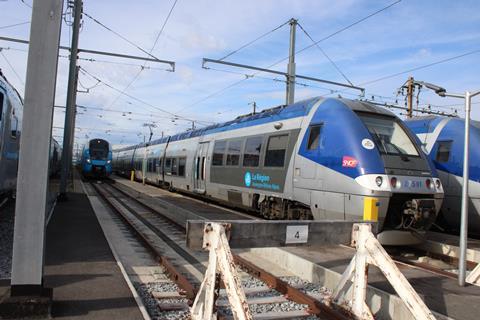
FRANCE: Auvergne-Rhône-Alpes région has signed a contract with SNCF Voyageurs to operate local passenger services from 2024 to 2033.
As with the agreements signed earlier by Région Sud and Grand Est, the 10-year contract is intended to prepare the way the arrival of private-sector operators; a competitive tendering policy will apply in Auvergne-Rhône-Alpes from 2029 onwards. The région currently manages around 1 500 TER services a day.
Announced by SNCF President & Director-General Jean-Pierre Farandou and regional President Laurent Wauquiez during a visit to the technicentre at Lyon-Vénissieux, the 10-year agreement requires the operator to target an average increase in traffic of more than 30% across the network. SNCF Voyageurs is expected to increase ridership from around 220 000 passengers a day in 2024 to 300 000 by 2033.
Rolling stock renewal
To help achieve this increase, the regional authority plans to invest €3bn in new and refurbished rolling stock.
Around €1·5bn would be spent on the acquisition of 130 new trainsets, including additional Regio 2N electric multiple-units from Alstom. Another €1·2bn will fund the mid-life overhaul of 171 existing trains, while €300m is to be spent on improving maintenance facilities.
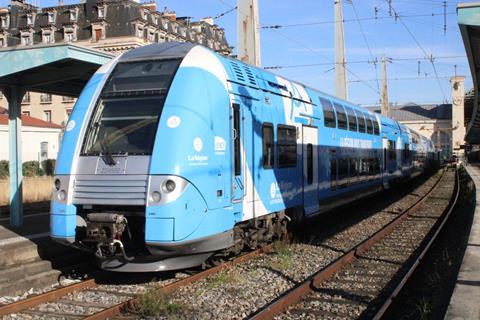
Of the 171 trainsets to be refurbished, 111 are AGC diesel, battery-electric and electric multiple-units, built by Bombardier. The remaining 60 are TER 2N NG double-deck EMUs of Class Z24500, built by Alstom.
The rolling stock refurbishment will be undertaken as part of the OPTER programme being delivered by SNCF Voyageurs Matériel for all of the French regions and Luxemburg’s national railway CFL.
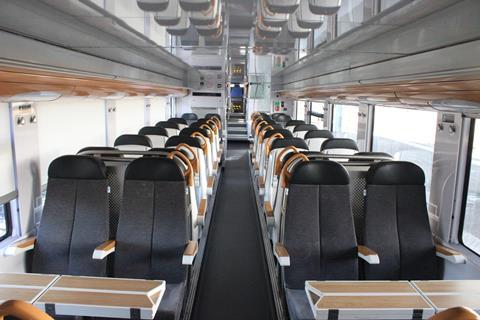
Work on the TER 2N NG sets is being undertaken at SNCF Voyageurs Matériel’s St-Pierre-des-Corps Industrial Technicentre nears Tours, while the AGCs are being refurbished at Nevers workshop. Work on each trainset takes around three months at a cost of €4m. The programme envisages the overhaul of 20 trains per year, with all sets to be refurbished by the end of 2030.
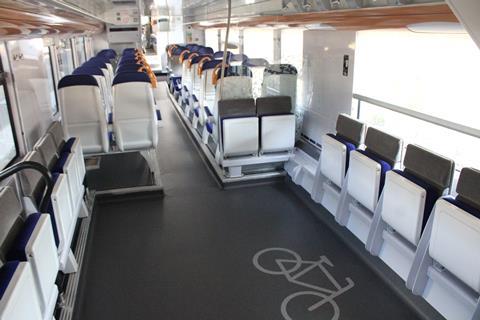
The region’s first refurbished TER 2N NG was unveiled at Lyon-Perrache station on March 22. The work included the upgrading of HVAC and CCTV systems and the replacement of the passenger information displays. The seats were replaced, and spaces created to provide for the carriage of bicycles, while the entrance doors were refreshed. The rebuilt unit has been outshopped in the livery of the region, both externally and internally.
Infrastructure investment
The authority also plans to invest the same amount as the national government in transport infrastructure under the terms of the next Contrat de Plan Etat-Région, with particular emphasis on rural lines.
So-called Services Express Régionaux Métropolitains will be introduced ‘as quickly as possible’, according to Wauquiez, who said that the agreement has been designed to put passengers at the heart of the arrangements.
Tenders
With an eye to tendering being launched for the 2029-34 period, the local network will be divided into five geographical groups:
- Auvergne routes;
- the Chambéry and Grenoble areas;
- the Savoie area and cross-border services into Switzerland, including the Leman Express network around Genève and the metre-gauge line to the resort of Chamonix and the Swiss border at Vallorcine;
- the Lyon area;
- long-distance regional services.
Under the terms of the agreement, the regional authority will take ownership of the entire rolling stock fleet and maintenance facilities, which could then be made available to other potential operators as well as SNCF.
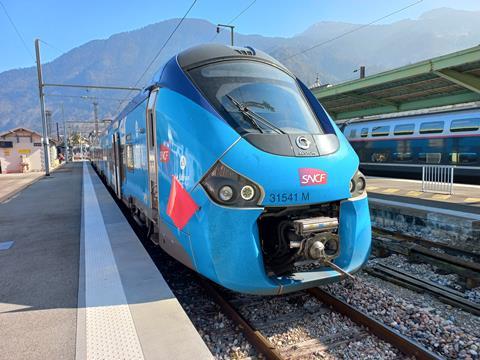
The operating contract is valued at around €590m a year, a reduction of €66m/year compared with the previous contract that ran from 2017 to 2022. The agreement specifies penalties for late or cancelled trains and sets out a range of additional requirements that include penalties for running short formations. Average penalty payments under the previous contract amounted to €7m/year, but under the new agreement this figure is expected to rise to €13m.
Other elements in the contract include better passenger security thanks to more frequent patrols by transport police across the network.

















